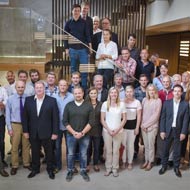
Global experts meet to discuss creation of a standard
A standard will be created for arena surfaces at equine jumping events, based on discussions held at a recent meeting in Switzerland.
A group of 36 equine, veterinary and footing specialists from three continents met in the city of Lausanne for the two-day forum.
Their discussions will provide the framework for a surfaces standard, which is "a major step forward", said Professor Lars Roepstorff from the Swedish University of Agricultural Sciences.
The meeting took place just over a year after the publication of the Equine Surfaces White Paper, which remains the world's most extensive study of the impact of arena surfaces on equine orthopaedic health.
Delegates looked at six years' worth of research funded by the FEI - the international governing body for equestrian sports.
Included in this was research that found the performance of arena surfaces is dependent on five parameters - impact firmness, cushioning, responsiveness, grip and uniformity.
Use of the correct materials and design of surfaces, alongside proper installation and suitable maintenance, were found to be a requirement for ensuring the performance of surfaces.
Delegates agreed that these three components should evolve into standards to protect horses and riders and inform manufacturers and event organisers.
"Everyone attending the forum has practical experience of events from all over the world, and everyone voiced the need by equestrian sport to demonstrate commitment to consistent footings at major events," said Dr Mick Peterson, executive director of the Racing Surfaces Testing Laboratory.
"It is critical that we retain our momentum so that we can provide consistent surfaces for all of the major events in the next year."
Image © Greg Takatch/FEI



 The Federation of Independent Veterinary Practices (FIVP) has announced a third season of its podcast, Practice Matters.
The Federation of Independent Veterinary Practices (FIVP) has announced a third season of its podcast, Practice Matters.